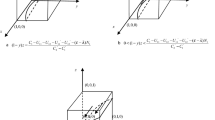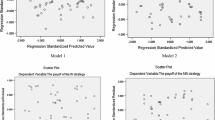Abstract
This paper fully considers the influence of the government, platforms, drivers and passengers on the regulation of online car-hailing market, and constructs an evolutionary game model of four parties. Then, the strategic stability of evolutionary game model is analyzed. Eleven strategies satisfying the stability conditions are obtained. Finally, the simulation verify the results of analysis. The simulation shows that parties’ decisions will be changed by the strength of the initial willingness. When the rewards and punishments increase, the self-restraint ability of the platform and the drivers can be strengthened. And then, by analyzing the managerial cost, this paper finds that reducing cost can accelerate the system to the stable state. Based on this, the paper puts forward relevant policy suggestions to promote the regulation of online car-hailing market.













Similar content being viewed by others
References
Al Haddad, C., Chaniotakis, E., Straubinger, A., Plötner, K., & Antoniou, C. (2020). Factors affecting the adoption and use of urban air mobility. Transportation Research Part A: Policy and Practice, 132, 696–712.
Armstrong, M. (2006). Competition in two-sided markets. The RAND Journal of Economics, 37(3), 668–691.
Barykin, S. Y., Kapustina, I. V., Kalinina, O. V., Dubolazov, V. A., Esquivel, C. A. N., Alyarovna, N. E., & Sharapaev, P. (2021). The sharing economy and digital logistics in retail chains: Opportunities and threats. Academy of Strategic Management Journal, 20, 1–14.
Brady, M., Mamanduru, V. K., & Tiwari, M. K. (2017). An evolutionary algorithmic approach to determine the nash equilibrium in a duopoly with nonlinearities and constraints. Expert Systems with Applications, 74, 29–40.
Brail, S. (2018). From renegade to regulated: The digital platform economy, ride-hailing and the case of Toronto. Canadian Journal of Urban Research, 27(2), 51–63.
Chordiya, R., Sabharwal, M., Relly, J. E., & Berman, E. M. (2020). Organizational protection for whistleblowers: A cross-national study. Public Management Review, 22(4), 527–552.
Christensen, C. M., McDonald, R., Altman, E. J., & Palmer, J. (2016). Disruptive innovation: Intellectual history and future paths. Harvard Business School Cambridge.
Contreras, S. D., & Paz, A. (2018). The effects of ride-hailing companies on the taxicab industry in las Vegas, Nevada. Transportation Research Part A: Policy and Practice, 115, 63–70.
Dudley, G., Banister, D., & Schwanen, T. (2017). The rise of uber and regulating the disruptive innovator. The Political Quarterly, 88(3), 492–499.
Flores, O., & Rayle, L. (2017). How cities use regulation for innovation: The case of Uber, Lyft and Sidecar in San Francisco. Transportation Research Procedia, 25, 3756–3768.
Friedman, D. (1998). On economic applications of evolutionary game theory. Journal of Evolutionary Economics, 8, 15–43.
Hawlitschek, F., Teubner, T., & Gimpel, H. (2018). Consumer motives for peer-to-peer sharing. Journal of Cleaner Production, 204, 144–157.
Hu, B., Xia, X., Sun, H., & Dong, X. (2019). Understanding the imbalance of the taxi market: From the high-quality customer’s perspective. Physica A: Statistical Mechanics and its Applications, 535, 122297.
Huang, Z., Xiong, X., Chen, W., Zhang, Q., Liu, Y., & Chen, Y. (2018). Three bounded proofs for nonlinear multi-input multi-output approximate dynamic programming based on the l yapunov stability theory. Optimal Control Applications and Methods, 39(1), 35–50.
Ji, P., Ma, X., & Li, G. (2015). Developing green purchasing relationships for the manufacturing industry: An evolutionary game theory perspective. International Journal of Production Economics, 166, 155–162.
Jiang, H., & Wang, H. (2020). China’s regulatory approach to the sharing economy: A perspective on ride-hailing. University of Illinois Journal of Law, Technology & Policy, 85, 24.
Jiang, H., & Zhang, X. (2019). An experimental model of regulating the sharing economy in China: The case of online car hailing. Computer Law & Security Review, 35(2), 145–156.
Lei, L., & Gao, S. (2018). Evolutionary game analysis of ridesourcing industry between transportation network companies and passengers under new policies of ridesourcing. IEEE Access, 6, 71918–71931.
Lei, L.-C., Gao, S., & Zeng, E.-Y. (2020). Regulation strategies of ride-hailing market in China: An evolutionary game theoretic perspective. Electronic Commerce Research, 20(3), 535–563.
Leung, X. Y., Xue, L., & Wen, H. (2019). Framing the sharing economy: Toward a sustainable ecosystem. Tourism Management, 71, 44–53.
Li, L., Bai, Y., Song, Z., Chen, A., & Wu, B. (2018). Public transportation competitiveness analysis based on current passenger loyalty. Transportation Research Part A: Policy and Practice, 113, 213–226.
Li, X., Zhang, S., Liu, D., Cheng, T., & Zhang, Z. (2022). Policy evaluation and policy style analysis of ride-hailing in china from the perspective of policy instruments: The introduction of a toe three-dimensional framework. Processes, 10(10), 2035.
Miller, S. R. (2016). First principles for regulating the sharing economy. Harvard Journal on Legislation, 53, 147.
Nguyen-Phuoc, D. Q., Vo, N. S., Su, D. N., Nguyen, V. H., & Oviedo-Trespalacios, O. (2021). What makes passengers continue using and talking positively about ride-hailing services? the role of the booking app and post-booking service quality. Transportation Research Part A: Policy and Practice, 150, 367–384.
Nguyen-Phuoc, Duy Q., Tran, Phuong Thi Kim., Su, Diep Ngoc., Oviedo-Trespalacios, Oscar., & Johnson, L.W. (2021). Nguyen-Phuoc, Duy Q and Tran, Phuong Thi Kim and Su, Diep Ngoc and Oviedo-Trespalacios, Oscar and Johnson, Lester W. Travel behaviour and society 24, 218–230.
Ozkan-Canbolat, E., Beraha, A., & Bas, A. (2016). Application of evolutionary game theory to strategic innovation. Procedia-Social and Behavioral Sciences, 235, 685–693.
Pu, D., Xie, F., & Yuan, G. (2020). Active supervision strategies of online ride-hailing based on the tripartite evolutionary game model. IEEE Access, 8, 149052–149064.
Selten, R., & Selten, R. (1988). A note on evolutionarily stable strategies in asymmetric animal conflicts (pp. 67–75). Berlin: Springer.
Sun, Q., He, Y., Wang, Y., Ma, F., et al. (2019). Evolutionary game between government and ride-hailing platform: Evidence from China. Discrete Dynamics in Nature and Society, 2019, 568.
Tang, Q. (2020). The regulative path on ‘special car’and other sharing economies. China Legal Science, 4, 286–302.
Teubner, T., & Flath, C. M. (2020). Privacy in the sharing economy. Journal of the Association for Information Systems, 20(3), 2.
Wang, W., Zhang, Y., Feng, L., Wu, Y. J., & Dong, T. (2020). A system dynamics model for safety supervision of online car-hailing from an evolutionary game theory perspective. IEEE Access, 8, 185045–185058.
Weng, Z., & Luo, P. (2021). Supervision of the default risk of online car-hailing platform from an evolutionary game perspective. Sustainability, 13(2), 555.
Xiao, Z., Jiang, J., Zhu, Y., Ming, Z., Zhong, S., & Cai, S. (2015). A solution of dynamic vms placement problem for energy consumption optimization based on evolutionary game theory. Journal of Systems and Software, 101, 260–272.
Zhan, X., Szeto, W., & Chen, X. M. (2022). The dynamic ride-hailing sharing problem with multiple vehicle types and user classes. Transportation Research Part E: Logistics and Transportation Review, 168, 102891.
Zhong, Y., Yang, T., Cao, B., & Cheng, T. (2022). On-demand ride-hailing platforms in competition with the taxi industry: Pricing strategies and government supervision. International Journal of Production Economics, 243, 108301.
Funding
The present research work has been supported by Social Science Planning Project of Chongqing, China [No. 2019YBGL049] and Transportation Science and Technology Project of Chongqing Transportation Bureau, No. 2022-17. The authors gratefully acknowledge the support of these institutions.
Author information
Authors and Affiliations
Corresponding author
Ethics declarations
Conflict of interest
The authors declare that they have no known competing financial interests or personal relationships that could have appeared to influence the work reported in this paper.
Additional information
Publisher's Note
Springer Nature remains neutral with regard to jurisdictional claims in published maps and institutional affiliations.
Rights and permissions
Springer Nature or its licensor (e.g. a society or other partner) holds exclusive rights to this article under a publishing agreement with the author(s) or other rightsholder(s); author self-archiving of the accepted manuscript version of this article is solely governed by the terms of such publishing agreement and applicable law.
About this article
Cite this article
Peng, Y., Hou, Y. & Gao, S. Online Car-Hailing Market Regulation Strategy in China: From the Perspective of Quadrilateral Evolutionary Games. Comput Econ (2023). https://doi.org/10.1007/s10614-023-10461-9
Accepted:
Published:
DOI: https://doi.org/10.1007/s10614-023-10461-9




